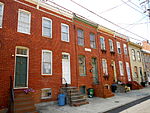South Central Avenue Historic District

South Central Avenue Historic District is a national historic district in Baltimore, Maryland, United States. It contains brick two- and three-story industrial and residential buildings reflecting over 150 years of utilitarian adaptation of buildings and space. The district includes early 19th century rowhouses, late 19th century and early 20th century manufacturing and warehouse buildings, gas stations, stables, car barns, commercial/residential buildings, and corner stores. Several larger buildings are the Bagby Furniture Company Building (4 stories), the Strauss Malt House (5 stories), and the Alameda School. Many rowhouses have been covered with formstone.It was added to the National Register of Historic Places in 2001.
Excerpt from the Wikipedia article South Central Avenue Historic District (License: CC BY-SA 3.0, Authors, Images).South Central Avenue Historic District
South Central Avenue, Baltimore
Geographical coordinates (GPS) Address Nearby Places Show on map
Geographical coordinates (GPS)
| Latitude | Longitude |
|---|---|
| N 39.286666666667 ° | E -76.599444444444 ° |
Address
South Central Avenue 321
21202 Baltimore
Maryland, United States
Open on Google Maps








